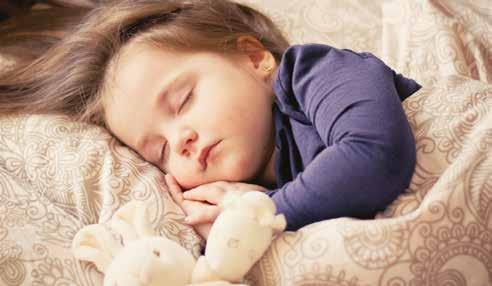Better Sleep
How to get a good night’s sleep We spend a third of our lives doing it. It’s vital to our health and wellbeing. And yet we don’t always pay enough attention to why we need it! The answer, of course, is sleep. “People go to huge amounts of time and expense to eat well and exercise regularly but without a good night’s sleep, all that effort will be in vain. Sleep doesn’t just make us feel better, it can improve our health by decreasing the risk of heart attacks, diabetes and strokes - and it helps us fight off minor ailments, deal better with depression and even tackle weight problems,” said Lisa Artis of The Sleep Council. And it’s not just adults who need to become more ‘sleep aware’, so do children and teenagers. “While it’s extremely important for parents to know how much sleep their child needs, we also need to teach youngsters about good sleep behaviour – and from an early age too,” said Lisa. “If a child isn’t getting enough sleep, then the parents probably aren’t either - causing increasing stress among the whole family.” A decent night’s sleep will help children to do better at school, allow them to react more quickly to situations, have a more developed memory, learn more effectively and solve problems. Plus, it will make them less susceptible to colds and other minor ailments, less irritable and better behaved. Sleep deprivation causes increased hyperactivity and other behavioural problems, as well as damaging physical and mental development. Poor sleep habits from an early age can lead to long term sleep problems. Added Lisa: “An increasing body of evidence shows the damaging effect on children and teenagers who get less sleep than they need - from weight gain to depression, from poor performance and concentration to reduced creative
ability and lower immunity to diseases. This comes at a time when the pressures of the modern world are definitely leading to decreased sleep times.” Daytime tiredness in young children and students is a real issue and The Sleep Council’s Time to Learn survey in 2012 revealed that lack of sleep among primary school children was having a devastating effect in schools, with nine out of 10 teachers (92%) complaining that pupils were so tired they were unable to pay attention in class. Worryingly, more than a third (38%) of teachers said lack of sleep among youngsters is a daily problem for them. “While we teach children about nutrition and ensure regular exercise is part of their weekly activities, the third critical ingredient of a healthy lifestyle – sleep – is barely touched upon. Youngsters need to know that a healthy lifestyle includes a good night’s sleep,” said Lisa. “Lack of sleep is something of a national epidemic, so it is particularly important for parents to establish good sleep hygiene habits at an early age - not letting them stay up too late, sleep wherever they want and demand snacks and attention in the middle of the night.” There are so many different factors which can affect children’s sleep so parents should check the obvious causes first such as room temperature, light, noise, hunger or thirst. Other influences are illness (actual or impending), changes or stress in the family, holidays and fear.
Here are The Sleep Council’s top tips for parents: Establishing and sticking to a bedtime routine right from the start until early teens can go a long way to minimising later problems. This is normally along the lines of teatime, followed by quiet play, bath, story and then bed. Bedtime should be around the same time each evening (although on non-school nights, older children already established in a good sleep pattern may be allowed to stay up later). Don’t expect children to go to sleep immediately – after all, most adults don’t – and they should be allowed to read or play quietly until they drop off. It’s still promoting a relaxing environment. If your child can’t sleep, don’t be tempted to get them back out of bed - instead encourage them to be quiet and lie down. Try not to get cross with your child if they’re refusing to go to sleep. This only aggravates the situation and doesn’t aid the relaxing atmosphere before bed. Ensure the environment is right for sleep – it should be cool, quiet, dark and free from distraction. Ideally computers, gaming machines and TVs should be banned from the bedroom but if that’s unlikely then at least keep them away from the bed and try to limit the use of these devices in the hour just before bedtime! It’s also extremely important to make sure the bed is comfortable and supportive for a growing child – many parents think nothing of spending a fortune on shoes for a child’s growing feet but scrimp on a mattress. Also make the bed a welcoming, positive place – never send kids to bed if they’re being naughty! Keep regular bedtime hours. A good sleep routine will work wonders. Know how much sleep your child needs. As a general rule of thumb, toddlers need around 12 hours of sleep a night; children aged four to six – 10.5-11.5 hours; six-12 years olds – 10 hours; and teenagers – around eight to nine hours. For more information visit sleepcouncil.org.uk
10
Families Central Scotland






